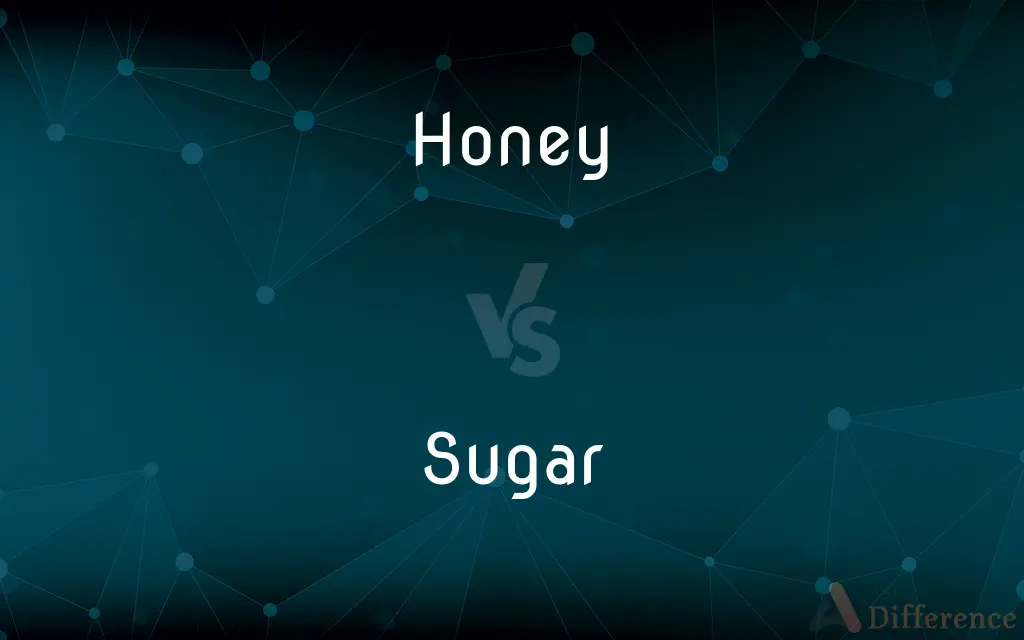Honey vs. Sugar — What's the Difference?
By Tayyaba Rehman — Updated on September 23, 2023
Honey is a sweet substance made by bees from flower nectar, while sugar is a sweet crystalline substance derived mainly from sugarcane or sugar beet.

Difference Between Honey and Sugar
Table of Contents
ADVERTISEMENT
Key Differences
Honey is a natural sweetener that is produced by bees from the nectar they collect from flowers. This sweet substance not only provides energy to bees but also contains various vitamins, minerals, and enzymes beneficial to humans. Sugar, on the other hand, is a sweetener processed mainly from sugarcane or sugar beet plants. The refining process removes most of its nutrients, resulting in pure carbohydrates.
In terms of taste, honey has a unique flavor profile influenced by the types of flowers visited by bees. Different floral sources yield honeys with varying colors, textures, and tastes. Sugar possesses a more uniform and consistent sweetness, lacking the intricate flavor nuances found in honey.
Honey, being less processed, retains a viscous and liquid consistency, with some varieties crystallizing over time. Sugar undergoes extensive refinement, yielding granulated, powdered, or cubed forms, commonly used in cooking and baking.
Additionally, some individuals prefer honey as a sweetening alternative due to its natural origin and potential health benefits. In contrast, sugar, especially in excessive amounts, is often associated with various health concerns like weight gain and dental problems.
Comparison Chart
Origin
Made by bees from flower nectar.
Derived mainly from sugarcane or sugar beet.
ADVERTISEMENT
Nutritional Content
Contains vitamins, minerals, and enzymes.
Largely devoid of nutrients; primarily carbohydrates.
Consistency
Viscous liquid, can crystallize.
Granulated, powdered, or cubed.
Flavor Profile
Unique flavors based on floral sources.
Uniform and consistent sweetness.
Processing Level
Less processed; natural.
Highly refined.
Compare with Definitions
Honey
A natural sweetening agent.
She added honey to her tea instead of sugar.
Sugar
Derived from sugarcane or sugar beet.
The sugar industry is significant in many tropical regions.
Honey
A source of energy for bees.
Bees consume honey during times when nectar is scarce.
Sugar
Used in cooking and baking.
The recipe calls for one cup of sugar.
Honey
Honey is a sweet, viscous food substance made by honey bees and some related insects, such as stingless bees. Bees produce honey from the sugary secretions of plants (floral nectar) or from secretions of other insects (such as honeydew), by regurgitation, enzymatic activity, and water evaporation.
Sugar
Sugar is the generic name for sweet-tasting, soluble carbohydrates, many of which are used in food. Table sugar, granulated sugar, or regular sugar, refers to sucrose, a disaccharide composed of glucose and fructose.
Honey
A sweet, sticky yellowish-brown fluid made by bees and other insects from nectar collected from flowers.
Sugar
A sweet crystalline or powdered substance, white when pure, consisting of sucrose obtained mainly from sugarcane and sugar beets and used in many foods, drinks, and medicines to improve their taste. Also called table sugar.
Honey
An excellent example of something
It's one honey of an adaptation
Sugar
Any of a class of water-soluble crystalline carbohydrates, including sucrose and lactose, having a characteristically sweet taste and classified as monosaccharides, disaccharides, and trisaccharides.
Honey
A sweet yellowish or brownish viscid fluid produced by various bees from the nectar of flowers and used as food.
Sugar
A unit, such as a lump or cube, in which sugar is dispensed or taken.
Honey
A similar substance made by certain other insects.
Sugar
(Slang) Sweetheart. Used as a term of endearment.
Honey
A sweet substance, such as nectar or syrup.
Sugar
To coat, cover, or sweeten with sugar.
Honey
Sweetness; pleasantness
"The first few years could not have been all honey" (Nadine Gordimer).
Sugar
To make less distasteful or more appealing.
Honey
(Informal) Sweetheart; dear. Used as a term of endearment.
Sugar
To form sugar.
Honey
(Informal) Something remarkably fine
A honey of a car.
Sugar
To form granules; granulate.
Honey
To sweeten with honey; add honey to.
Sugar
To make sugar or syrup from sugar maple sap. Often used with off.
Honey
To make pleasant or appealing
His words were honeyed as he spoke.
Sugar
(uncountable) Sucrose in the form of small crystals, obtained from sugar cane or sugar beet and used to sweeten food and drink.
Honey
To give a yellow or golden color to.
Sugar
(countable) A specific variety of sugar.
Honey
(uncountable) A viscous, sweet fluid produced from plant nectar by bees. Often used to sweeten tea or to spread on baked goods.
The honey in the pot should last for years.
Sugar
Any of various small carbohydrates that are used by organisms to store energy.
Honey
(countable) A variety of this substance.
Sugar
(countable) A small serving of this substance (typically about one teaspoon), used to sweeten a drink.
He usually has his coffee white with one sugar.
Honey
(rare) Nectar.
Sugar
(countable) A term of endearment.
I'll be with you in a moment, sugar.
Honey
(figuratively) Something sweet or desirable.
Sugar
A kiss.
Honey
A term of affection.
Honey, would you take out the trash?
Honey, I'm home.
Sugar
Effeminacy in a male, often implying homosexuality.
I think John has a little bit of sugar in him.
Honey
A woman, especially an attractive one.
Man, there are some fine honeys here tonight!
Sugar
Diabetes.
Honey
A spectrum of pale yellow to brownish-yellow colour, like that of most types of (the sweet substance) honey.
Sugar
(dated) Anything resembling sugar in taste or appearance, especially in chemistry.
Sugar of lead (lead acetate) is a poisonous white crystalline substance with a sweet taste.
Honey
Involving or resembling honey.
Sugar
Compliment or flattery used to disguise or render acceptable something obnoxious; honeyed or soothing words.
Honey
Of a pale yellow to brownish-yellow colour, like most types of honey.
Sugar
Heroin.
Honey
(transitive) To sweeten; to make agreeable.
Sugar
Money.
Honey
(transitive) To add honey to.
Sugar
(programming) syntactic sugar.
Honey
(intransitive) To be gentle, agreeable, or coaxing; to talk fondly; to use endearments.
Sugar
(transitive) To add sugar to; to sweeten with sugar.
John heavily sugars his coffee.
Honey
(intransitive) To be or become obsequiously courteous or complimentary; to fawn.
Sugar
(transitive) To make (something unpleasant) seem less so.
She has a gift for sugaring what would otherwise be harsh words.
Honey
A sweet viscid fluid, esp. that collected by bees from flowers of plants, and deposited in the cells of the honeycomb.
Sugar
In making maple sugar, to complete the process of boiling down the syrup till it is thick enough to crystallize; to approach or reach the state of granulation; with the preposition off.
Honey
That which is sweet or pleasant, like honey.
The honey of his language.
Sugar
(entomology) To apply sugar to trees or plants in order to catch moths.
Honey
Sweet one; - a term of endearment.
Honey, you shall be well desired in Cyprus.
Sugar
To rewrite (source code) using syntactic sugar.
Honey
To be gentle, agreeable, or coaxing; to talk fondly; to use endearments; also, to be or become obsequiously courteous or complimentary; to fawn.
Rough to common men,But honey at the whisper of a lord.
Sugar
(transitive) To compliment (a person).
Honey
To make agreeable; to cover or sweeten with, or as with, honey.
Canst thou not honey me with fluent speech?
Sugar
To remove hair using a paste of sugar, water, and lemon juice.
Honey
A sweet yellow liquid produced by bees
Sugar
(minced oath) Used in place of shit!
Oh, sugar!
Honey
A beloved person; used as terms of endearment
Sugar
A sweet white (or brownish yellow) crystalline substance, of a sandy or granular consistency, obtained by crystallizing the evaporated juice of certain plants, as the sugar cane, sorghum, beet root, sugar maple, etc. It is used for seasoning and preserving many kinds of food and drink. Ordinary sugar is essentially sucrose. See the Note below.
Honey
Sweeten with honey
Sugar
By extension, anything resembling sugar in taste or appearance; as, sugar of lead (lead acetate), a poisonous white crystalline substance having a sweet taste.
Honey
Having the color of honey
Sugar
Compliment or flattery used to disguise or render acceptable something obnoxious; honeyed or soothing words.
Why, do not or know you, grannam, and that sugar loaf?
Honey
A sweet substance made by bees.
The toast tasted better with honey on top.
Sugar
In making maple sugar, to complete the process of boiling down the sirup till it is thick enough to crystallize; to approach or reach the state of granulation; - with the preposition off.
Honey
A viscous liquid varying in color.
This jar of honey is darker due to its wildflower origin.
Sugar
To impregnate, season, cover, or sprinkle with sugar; to mix sugar with.
Honey
Nectar-derived bee product.
The flowers in the region influence the taste of the honey.
Sugar
To cover with soft words; to disguise by flattery; to compliment; to sweeten; as, to sugar reproof.
With devotion's visageAnd pious action we do sugar o'erThe devil himself.
Sugar
A white crystalline carbohydrate used as a sweetener and preservative
Sugar
An essential structural component of living cells and source of energy for animals; includes simple sugars with small molecules as well as macromolecular substances; are classified according to the number of monosaccharide groups they contain
Sugar
Informal terms for money
Sugar
Sweeten with sugar;
Sugar your tea
Sugar
A sweet crystalline substance.
He stirred two teaspoons of sugar into his coffee.
Sugar
A carbohydrate used for energy.
Athletes sometimes consume sugar for quick energy.
Sugar
A common sweetening agent.
Many beverages contain added sugar.
Common Curiosities
Can I substitute sugar for honey in recipes?
Yes, but adjustments in liquid content and sweetness may be required.
Which has more calories, honey or sugar?
Gram for gram, honey has more calories than sugar, but it's also sweeter, so you might use less.
Is honey healthier than sugar?
Honey contains nutrients and antioxidants, making it nutritionally richer than sugar, but moderation is key for both.
Do honey and sugar have the same sweetness?
No, honey is sweeter than granulated sugar, so less may be needed in recipes.
Why is added sugar considered unhealthy?
Excessive intake can lead to weight gain, dental issues, and other health concerns.
Which is better for baking, honey or sugar?
Both work, but each affects moisture and sweetness differently.
Is raw honey different from regular honey?
Yes, raw honey hasn't been heated or filtered, retaining more natural properties.
Are there different types of sugar?
Yes, including granulated, brown, powdered, and raw sugar, each with unique properties.
Does honey have an expiration date?
Honey can last indefinitely, but its texture and color might change.
Are there medicinal benefits to honey?
Honey has antimicrobial properties and has been used in traditional remedies.
Why does honey sometimes crystallize?
Natural sugars in honey can solidify over time, but it's still safe to eat.
Can vegans consume honey?
Some vegans avoid honey as it's an animal product, while others may consume it.
Is sugar a natural product?
While derived from natural sources, the sugar we consume is often highly refined.
How are the tastes of honey and sugar different?
While both are sweet, honey has complex flavors influenced by floral sources, whereas sugar has a straightforward sweetness.
Does sugar aid fermentation in baking?
Yes, sugar feeds yeast, aiding in fermentation.
Share Your Discovery

Previous Comparison
Branch vs. Subsidiary
Next Comparison
Ivory vs. LinenAuthor Spotlight
Written by
Tayyaba RehmanTayyaba Rehman is a distinguished writer, currently serving as a primary contributor to askdifference.com. As a researcher in semantics and etymology, Tayyaba's passion for the complexity of languages and their distinctions has found a perfect home on the platform. Tayyaba delves into the intricacies of language, distinguishing between commonly confused words and phrases, thereby providing clarity for readers worldwide.












































